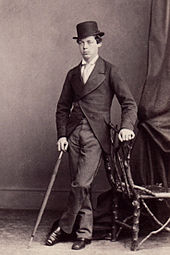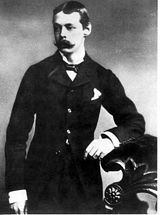- Lord Randolph Churchill
-
For the son of Sir Winston Churchill, see Randolph Churchill.
The Right Honourable
Lord Randolph Churchill
PC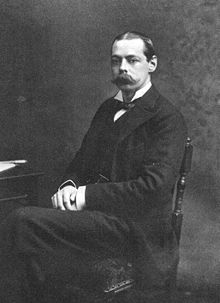
Chancellor of the Exchequer In office
3 August 1886 – 22 December 1886Prime Minister Marquess of Salisbury Preceded by William Vernon Harcourt Succeeded by Viscount Goschen Leader of the House of Commons In office
3 August 1886 – 14 January 1887Prime Minister Marquess of Salisbury Preceded by William Ewart Gladstone Succeeded by William Henry Smith Secretary of State for India In office
24 June 1885 – 28 January 1886Prime Minister Marquess of Salisbury Preceded by Earl of Kimberley Succeeded by Earl of Kimberley Personal details Born 13 February 1849
Belgravia, LondonDied 24 January 1895 (aged 45)
LondonPolitical party Conservative Spouse(s) Jennie Jerome Children Winston Churchill
John ChurchillProfession Politician Lord Randolph Henry Spencer-Churchill MP (13 February 1849 – 24 January 1895) was a British statesman. He was the third son of the 7th Duke of Marlborough and his wife Lady Frances Anne Emily Vane (1822–1899), daughter of the 3rd Marquess of Londonderry. He was the father of Winston Churchill, the future wartime Prime Minister, who wrote his father's first major biography.[1]
Contents
Early life
He was born at Blenheim Palace, near Woodstock, Oxfordshire. He was at first privately educated, and later attended Tabor's Preparatory School at Cheam, London. In January 1863 he went to Eton College, where he remained until July 1865. He did not stand out either at academic work or sport while at Eton; his contemporaries describe him as a vivacious and rather unruly boy. In October 1867 he matriculated at Merton College, Oxford. He had a liking for sport, but was also an avid reader, and obtained a second-class degree in jurisprudence and modern history in 1870. In 1874 he was elected to Parliament as Conservative member for Woodstock, Oxfordshire defeating George Brodrick, a fellow, and afterwards warden, of Merton College. His maiden speech, delivered in his first session, prompted compliments from Harcourt and Disraeli, who wrote to the Queen of Churchill's 'energy and natural flow'.
Influential marriage
Lord Randolph Churchill married on 15 April 1874 Jennie Jerome, daughter of Leonard Jerome, of New York in the United States, by whom he had two sons:
- Winston Leonard Spencer-Churchill (1874–1965)
- John Strange Spencer-Churchill (1880–1947).
Jennie Jerome's social contacts greatly helped advance Lord Randolph's early career.
In January 1875, Lord Randolph made a series of visits to his doctor, Oscar Clayton, for "an undisclosed ailment". Frank Harris later claimed that this was syphilis.[2] However, recent scholarship has exploded the hypothesis that Lord Randolph died of the disease, without providing a definitive alternative.[3]
The "Fourth Party"
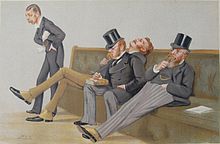

"The Fourth Party" Spencer-Churchill, Balfour, Drummond-Wolff and Gorst as caricatured by Spy (Leslie Ward) in Vanity Fair, December 1880 It was not until 1878 that he came to public notice as the exponent of a species of independent Conservatism. He made a series of furious attacks on Sir Stafford Northcote, R. A. Cross, and other prominent members of the "old gang". George Sclater-Booth (afterwards 1st Baron Basing), President of the Local Government Board, was a specific target, and the minister's County Government Bill was fiercely denounced as the "crowning dishonour to Tory principles", and the "supreme violation of political honesty". Lord Randolph's attitude, and the vituperative fluency of his invective, made him a parliamentary figure of some importance before the dissolution of the 1874 parliament, though he was not yet taken quite seriously.
In the new parliament of 1880 he speedily began to play a more notable role. Along with Sir Henry Drummond-Wolff, Sir John Gorst and occasionally Arthur Balfour, he made himself known as the audacious opponent of the Liberal administration and the unsparing critic of the Conservative front bench. The "fourth party", as it was nicknamed, at first did little damage to the government, but awakened the opposition from its apathy; Churchill roused the Conservatives by leading resistance to Charles Bradlaugh, the member for Northampton, who, though an avowed atheist or agnostic, was prepared to take the parliamentary oath. Sir Stafford Northcote, the Conservative leader in the Lower House, was forced to take a strong line on this difficult question by the energy of the fourth party. The long controversy over Bradlaugh's seat, showed that Lord Randolph Churchill was a parliamentary champion who added to his audacity much tactical skill and shrewdness. He continued to play a conspicuous part throughout the parliament of 1880 to 1885, targeting William Ewart Gladstone as well as the Conservative front bench, some of whose members, particularly Sir Richard Cross and William Henry Smith, he singled out for attack.
From the beginning of the Egyptian imbroglio Lord Randolph was emphatically opposed to almost every step taken by the government. He declared that the suppression of Urabi Pasha's rebellion was an error, and the restoration of the khedive's authority a crime. He called Gladstone the "Moloch of Midlothian", for whom torrents of blood had been shed in Africa. He was equally severe on the domestic policy of the administration, and was particularly bitter in his criticism of the Kilmainham Treaty and the rapprochement between the Gladstonians and the Parnellites.
Tory Democracy
By 1885 he had formulated the policy of progressive Conservatism which was known as "Tory Democracy". He declared that the Conservatives ought to adopt, rather than oppose, popular reforms, and to challenge the claims of the Liberals to pose as champions of the masses. His views were largely accepted by the official Conservative leaders in the treatment of the Gladstonian Franchise Bill of 1884. Lord Randolph insisted that the principle of the bill should be accepted by the opposition, and that resistance should be focused on the refusal of the government to combine with it a scheme of redistribution. The prominent, and on the whole judicious and successful, part he played in the debates on these questions, still further increased his influence with the rank and file of the Conservatives in the constituencies.
At the same time he was actively spreading the gospel of democratic Toryism in a series of platform campaigns. In 1883 and 1884 he invaded the radical stronghold of Birmingham, and in the latter year took part in a Conservative garden party at Aston Manor, at which his opponents paid him the compliment of raising a serious riot. He gave constant attention to the party organisation, which had fallen into considerable disorder after 1880, and was an active promoter of the Primrose League.
Office
In 1884 progressive Toryism won out. At the conference of the Central Union of Conservative Associations, Lord Randolph was nominated chairman, despite the opposition of the parliamentary leaders. A split was averted by Lord Randolph's voluntary resignation; but the episode had confirmed his title to a leading place in the Tory ranks. It was strengthened by the prominent part he played in the events immediately preceding the fall of the Liberal government in 1885; and when Hugh Childers;s budget resolutions were defeated by the Conservatives, aided by about half the Parnellites, Lord Randolph Churchill's admirers were justified in proclaiming him to have been the "organiser of victory".
His services were, at any rate, far too important to be refused recognition; and in Lord Salisbury's cabinet of 1885 he was made Secretary of State for India. As the price of entry he demanded that Sir Stafford Northcote be removed from the Commons, despite being the Conservative leader there. Salisbury was more than willing to concede this and Northcote went to the Lords as the Earl of Iddlesleigh. During his tenure at the India Office during the short-lived minority Conservative administration, Churchill reversed policy over Burma. He sided with commercial interests and directed the Viceroy, Lord Dufferin, to invade Upper Burma in November 1885. With little discussion, Churchill then decided to annex the final remnant of the once great Burmese kingdom, adding it as a new province of the Indian Raj as a "New Year present" for Queen Victoria on New Year's Day 1886.
In the autumn election of 1885 he contested Birmingham Central against John Bright, and though defeated here, was at the same time returned by a very large majority for South Paddington. In the contest which arose over William Ewart Gladstone's Home Rule bill, Lord Randolph again bore a conspicuous part, and in the electioneering campaign his activity was only second to that of some of the Liberal Unionists, Lord Hartington, George Goschen and Joseph Chamberlain. He was now the recognised Conservative champion in the Lower Chamber, and when the second Salisbury administration was formed after the general election of 1886 he became Chancellor of the Exchequer and Leader of the House of Commons.
Eclipse
His management of the House was on the whole successful, and was marked by tact, discretion and temper. But he had never really reconciled himself with some of his colleagues, and there was a good deal of friction in his relations with them, which ended with his sudden resignation on 20 December 1886. Various motives influenced him in taking this surprising step; but the only ostensible cause was that put forward in his letter to Lord Salisbury, which was read in the House of Commons on 27 January. In this document he stated that his resignation was the result of his inability, as Chancellor of the Exchequer, to concur in the demands made on the Treasury by the ministers at the head of the naval and military establishments. It was commonly supposed that he expected his resignation to be followed by the unconditional surrender of the cabinet, and his restoration to office on his own terms. The sequel, however, was entirely different. The cabinet was reconstructed with Goschen as Chancellor of the Exchequer (Lord Randolph had "forgotten Goschen", as he is said to have remarked). For the next few years there was some speculation about a return to frontline politics, as often happens when a Cabinet minister resigns, but Churchill's own career as a Conservative chief was over.
Although he continued to sit in Parliament, his health was in serious decline throughout the 1890s. He bestowed much attention on society, travel and sport. He was an ardent supporter of the turf, and, in 1889, he won the Epsom Oaks with a mare named the Abbesse de Jouarre. In 1891, he went to South Africa, in search both of health and relaxation. He travelled for some months through Cape Colony,[4] the Transvaal and Rhodesia, making notes on the politics and economics of the countries, shooting lions, and recording his impressions in letters to a London newspaper, which were afterwards republished under the title of Men, Mines and Animals in South Africa. He attacked Gladstone's Second Home Rule Bill with energy, and gave fiery pro-Union speeches in Ireland.
During this time he coined the phrase "Ulster will fight, and Ulster will be right". But it was soon apparent that his powers were undermined by the illness which took his life at the age of 45. As the session of 1893 wore on, his speeches lost their old effectiveness, and in 1894 he was listened to not so much with interest as with pity. His last speech in the House was delivered in the debate on Uganda in June 1894, and was a painful failure. He was, in fact, dying. An attempted round-the-world journey failed to cure him. Lord Randolph started in the autumn of 1894, accompanied by his wife, but his illness made so much progress that he was brought back hurriedly from Cairo. He reached England shortly before Christmas and died in London. The gross value of his personal estate was entered in the Probate Registry at £75,971.[5] This is the financial equivalent of over £6.45 million in 2008 terms, using the retail price index.[6] He is buried near his wife and sons at St Martin's Church, Bladon, near Woodstock, Oxfordshire.
His widow, Lady Randolph Churchill, married George Cornwallis-West in 1900, when she became known as Mrs. George Cornwallis-West. After that marriage was dissolved, she resumed by deed poll her prior married name, Lady Randolph Churchill. (Lord Randolph was her husband's courtesy title as the younger son of a duke and in English law does not qualify as a noble title.) Lord Randolph's son, Sir Winston Churchill, died on 24 January 1965, exactly 70 years after the death of his father.
Movie, television, and literary depictions
The character Randolph Churchill has appeared in numerous movies and television productions about his son Winston. He is generally portrayed as a cold and distant man, although perhaps was no worse than many other fathers of his time and class.
He was featured in the film Edward the King as a more natural character, sociably similar to Albert Edward, Prince of Wales and his other friends. His downfall is represented when he confronted Alexandra, Princess of Wales and demanded her to use her influence with the Prince to stop Lord Aylesford proceeding with a divorce from his wife, Lady Aylesford, after she had planned to elope with Lord Randolph's elder brother, the Marquess of Blandford. He threatens to expose letters from the Prince to Lady Aylesford, so scandalous, so he says, that if they were to be exposed, "the Prince of Wales would never sit on the throne of England." Outraged, the Princess goes to see the Queen, who is equally indignant. The Prime Minister, Benjamin Disraeli, informs the Prince, who is so angry that he challenges Lord Randolph to a duel in the South of France. Eventually, Lord Aylesford does not attempt to seek a divorce from his wife, and Lord Blandford does not elope with Lady Aylesford. Lord Randolph sends a note of apology to the Prince, which is merely acknowledged. Disgraced, Lord Randolph and his wife leave for America.
Other notable appearances include the film Young Winston, in which he was portrayed by Robert Shaw, and the miniseries, Jennie, The Life of Lady Randolph Churchill.
Sir Winston refers to his father's career in several of the last chapters of A History of the English-Speaking Peoples.
He is the target of an assassination attempt in the J.M. Barrie novella about a secret society of killers, Better Dead.
Note on title
Lord Randolph's title was a courtesy title only, and therefore was not inherited by his eldest son Winston Churchill.
References
- ^ Churchill, Winston C. 1906. Lord Randolph Churchill. 2 vols, Macmillan, London.
- ^ Ted Morgan, Churchill: Young Man in a Hurry, 1874-1915 (1984), p. 23: "In January 1875, only a month after Winston's birth, Randolph made repeated visits to the family doctor, Oscar Clayton, for an undisclosed ailment. According to Frank Harris, the editor of Fortnightly Magazine, who published the revelation in his scandalous autobiography, My Life and Loves, Randolph caught syphilis..."
- ^ Lord Randolph Churchill: Maladies et Mort at 'myths' pages of Churchill Centre website
- ^ http://www.matjiesfontein.com/About/index.htm Visit to Matjiesfontein.
- ^ RANDOLPH CHURCHILL'S WILL.; Details of the Estate Bequeathed to His Wife and Children., The New York Times, March 5, 1895, Wednesday, Page 5
- ^ [1]
 This article incorporates text from a publication now in the public domain: Chisholm, Hugh, ed (1911). Encyclopædia Britannica (11th ed.). Cambridge University Press.
This article incorporates text from a publication now in the public domain: Chisholm, Hugh, ed (1911). Encyclopædia Britannica (11th ed.). Cambridge University Press.
External links
- Hansard 1803–2005: contributions in Parliament by Lord Randolph Churchill
- Lord Randolph Churchill at Find a Grave
- Archival material relating to Lord Randolph Churchill listed at the UK National Register of Archives
Parliament of the United Kingdom Preceded by
Henry BarnettMember of Parliament for Woodstock
1874 – 1885Succeeded by
Francis William MacleanNew constituency Member of Parliament for Paddington South
1885 – 1895Succeeded by
Sir Thomas George FardellParty political offices Preceded by
Earl PercyChairman of the National Union of
Conservative and Constitutional Associations
(jointly with Sir Michael Hicks Beach, Bt)
1884Succeeded by
Lord Claud HamiltonPolitical offices Preceded by
The Earl of KimberleySecretary of State for India
1885–1886Succeeded by
The Earl of KimberleyPreceded by
Sir William HarcourtChancellor of the Exchequer
1886Succeeded by
George GoschenPreceded by
Sir Michael Hicks-Beach, BtCommons Leader of the Conservatives
1886Succeeded by
William Henry SmithPreceded by
William GladstoneLeader of the House of Commons
1886Leaders of the House of Commons Walpole · Sandys · Pelham · Robinson · H Fox · Pitt the Elder · Vacant (Caretaker Ministry) · Pitt the Elder · Grenville · H Fox · Grenville · Conway · North · C Fox · Townshend · (C Fox/North) · Pitt the Younger · Addington · Pitt the Younger · C Fox · Howick · Perceval · Castlereagh · Canning · Huskisson · Peel · Althorp · Peel · Russell · Disraeli · Russell · Palmerston · Disraeli · Palmerston · Gladstone · Disraeli · Gladstone · Northcote · Gladstone · Hicks-Beach · Gladstone · R Churchill · Smith · Balfour · Gladstone · Harcourt · Balfour · Campbell-Bannerman · Asquith · Bonar Law · A Chamberlain · Bonar Law · Baldwin · MacDonald · Baldwin · MacDonald · Baldwin · MacDonald · Baldwin · N Chamberlain · W Churchill · Cripps · Eden · Morrison · Chuter Ede · Crookshank · Butler · Macleod · Lloyd · Bowden · Crossman · Peart · Whitelaw · Carr · Prior · Short · Foot · St John-Stevas · Pym · Biffen · Wakeham · Howe · MacGregor · Newton · Taylor · Beckett · Cook · Reid · Hain · Hoon · Straw · Harman · YoungPrime Minister
Foreign Secretary
Leader of the House of LordsThe Marquess of Salisbury (1885–1886)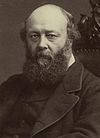
First Lord of the Treasury The Earl of Iddesleigh (1885–1886)Lord Chancellor The Lord Halsbury (1885–1886)Lord President of the Council The Viscount Cranbrook (1885–1886)Lord Privy Seal The Earl of Harrowby (1885–1886)Home Secretary Sir Richard Cross (1885–1886)Secretary of State for the Colonies Sir Frederick Stanley (1885–1886)Secretary of State for War William Henry Smith (1885–1886) • The Viscount Cranbrook (1886)Secretary of State for India Lord Randolph Churchill (1885–1886)First Lord of the Admiralty Lord George Hamilton (1885–1886)Chancellor of the Exchequer
Leader of the House of CommonsSir Michael Hicks Beach (1885–1886)President of the Board of Trade The Duke of Richmond (1885) • Edward Stanhope (1885–1886)Chief Secretary for Ireland William Henry Smith (1886)Postmaster General Lord John Manners (1885–1886)Lord Lieutenant of Ireland The Earl of Carnarvon (1885–1886)Lord Chancellor of Ireland The Lord Ashbourne (1885–1886)Secretary for Scotland The Duke of Richmond (1885–1886)Vice President of the Council Edward Stanhope (1885)Conservative Party History - History of the Conservative Party
- History of conservatism in Great Britain
- Tory Party
Leadership House of Lords
(1828–1922)House of Commons
(1834–1922)- Sir Robert Peel
- The Lord George Bentinck
- Marquess of Granby
- vacant (1848–1849)
- Benjamin Disraeli / Marquess of Granby / John Charles Herries
- Benjamin Disraeli
- Sir Stafford Northcote
- Sir Michael Hicks Beach
- The Lord Randolph Churchill
- W.H. Smith
- Arthur Balfour
- Andrew Bonar Law
- Sir Austen Chamberlain
- Steel-Maitland
- Younger
- Jackson
- Davidson
- Chamberlain
- Baird
- Hacking
- Dugdale
- Assheton
- Woolton
- Poole
- Hailsham
- Butler
- Macleod
- Blakenham
- du Cann
- Barber
- Thomas
- Carrington
- Whitelaw
- Thorneycroft
- Parkinson
- Gummer
- Tebbit
- Brooke
- Baker
- Patten
- Fowler
- Hanley
- Mawhinney
- Parkinson
- Ancram
- Davis
- May
- Fox
- Saatchi
- Maude
- Spelman
- Pickles
- Warsi
- Feldman
Leadership elections Related organisations - 1922 Committee
- Association of Conservative Clubs
- Atlantic Bridge
- Bow Group
- Bruges Group
- Carlton Club
- C-Change
- Centre for Policy Studies
- Centre for Social Justice
- Conservative Animal Welfare Group
- Conservative Campaign Headquarters
- Conservative Christian Fellowship
- Conservative Business Relations
- Conservative Countryside Forum
- Conservative Disability Group
- Conservative Europe Group
- Conservative Friends of Gibraltar
- Conservative Friends of Israel
- Conservative Friends of Turkey
- Conservative Future
- Conservative History Group
- Conservative Humanist Association
- Conservative Mainstream
- Conservative Medical Society
- Conservative Muslim Forum
- Conservative National Education Society
- Conservative National Property Advisory Committee
- Conservative Party Archive Trust
- Conservative Research Department
- Conservative Rural Action Group
- Conservative Technology Forum
- Conservative Trade Unionists
- Conservative Transport Group
- Conservative Way Forward
- Conservative Women National Committee
- Conservatives 4 Cities
- Conservatives at Work
- Conservatives for International Travel
- Conservatives in Northern Ireland
- Cornerstone Group
- Countryside Alliance
- European Democrats
- European Foundation
- Fresh Start
- International Democrat Union
- LGBTory
- Macleod Group
- Margaret Thatcher Foundation
- Monday Club
- 92 Group
- No Campaign
- No Turning Back
- Policy Exchange
- Society of Conservative Lawyers
- Tory Green Initiative
- Tory Reform Group
- Ulster Unionist Party
- Renewing One Nation
- Young Britons' Foundation
Categories:- Spencer-Churchill family
- Leaders of the Conservative Party (UK)
- Chancellors of the Exchequer of the United Kingdom
- British Secretaries of State
- Parents of national leaders
- Conservative Party (UK) MPs
- UK MPs 1874–1880
- UK MPs 1880–1885
- UK MPs 1885–1886
- UK MPs 1886–1892
- UK MPs 1892–1895
- Members of the United Kingdom Parliament for English constituencies
- Alumni of Merton College, Oxford
- Younger sons of dukes
- 1849 births
- 1895 deaths
- Leaders of the House of Commons
Wikimedia Foundation. 2010.

